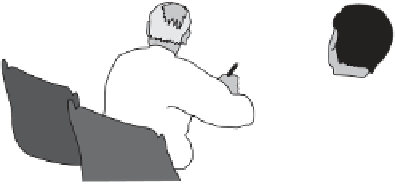Information Technology Reference
In-Depth Information
It's important to note that ethics is focused on the
voluntary, moral
choices people
make because they have decided they ought to take one course of action rather than
an alternative. Ethics is not concerned about involuntary choices or choices outside the
moral realm.
For example, if I am ordering a new car, I may get to choose whether it is red, white,
green, or blue. This choice is not in the moral realm, because it does not involve benefit
or harm to other people.
Now, suppose I'm driving my new red car down a city street. A pedestrian, obscured
from my view by a parked car, runs out into traffic. In an attempt to miss the pedestrian,
I swerve, lose control of my car, and kill another pedestrian walking along the sidewalk.
While my action caused harm to another person, this is not an example of ethical
decision making, because my decision was a reflex action rather than a reasoned choice.
However, suppose I did not have full control of the car because I had been driving
while intoxicated. In that case the consequences of my voluntary choice to drink alcohol
before driving affected another moral being (the innocent pedestrian). Now the problem
has entered the realm of ethics.
The formal study of ethics goes back at least 2,400 years, to the Greek philosopher
Socrates. Socrates did not put any of his philosophy in writing, but his student Plato
did. In Plato's dialogue called the
Crito
, imprisoned Socrates uses ethical reasoning to
explain why he ought to face an unjust death penalty rather than take advantage of an
opportunity to flee into exile with his family [3].
In the past two millennia, philosophers have proposed many ethical theories. In this
chapter we review some of them. How do we decide if a particular theory is useful? A
useful theory allows its proponents to examine moral problems, reach conclusions, and
defend those conclusions in front of a skeptical, yet open-minded audience (Figure 2.3).
FIGURE 2.3
A good ethical theory should enable you to make a persuasive, logical argument
to a diverse audience.






